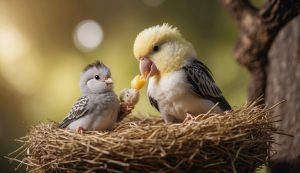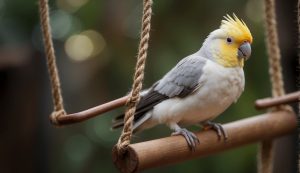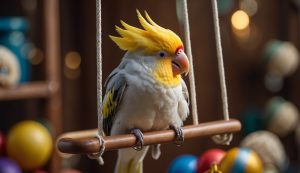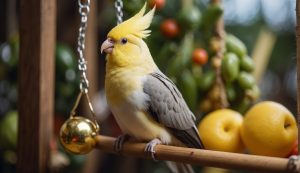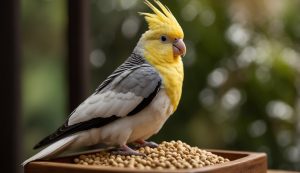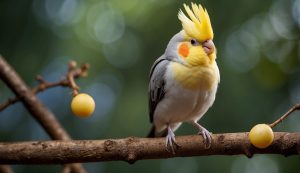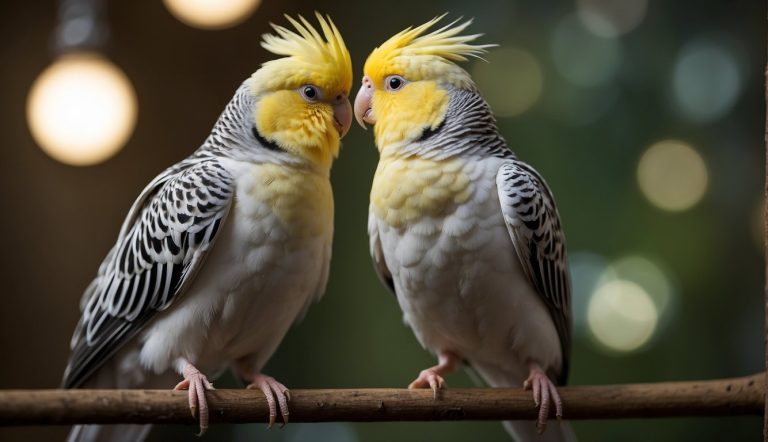Why Is My Cockatiel Shaking? Uncovering the Reasons Behind the Behavior

Observing a pet cockatiel’s behavior closely can reveal a lot about its health and well-being. Shaking can be regarded as one such behavior that may raise concern for owners.
It’s not uncommon for cockatiels to exhibit shaking or trembling, but the reasons behind this can vary.
Some causes are benign, such as the shaking off of dust or adjusting feathers, while others may signal that the bird is experiencing stress, fear, or even health issues.
Understanding the context of the shaking is crucial, as it helps in determining whether the situation is normal or if there is a cause for concern.
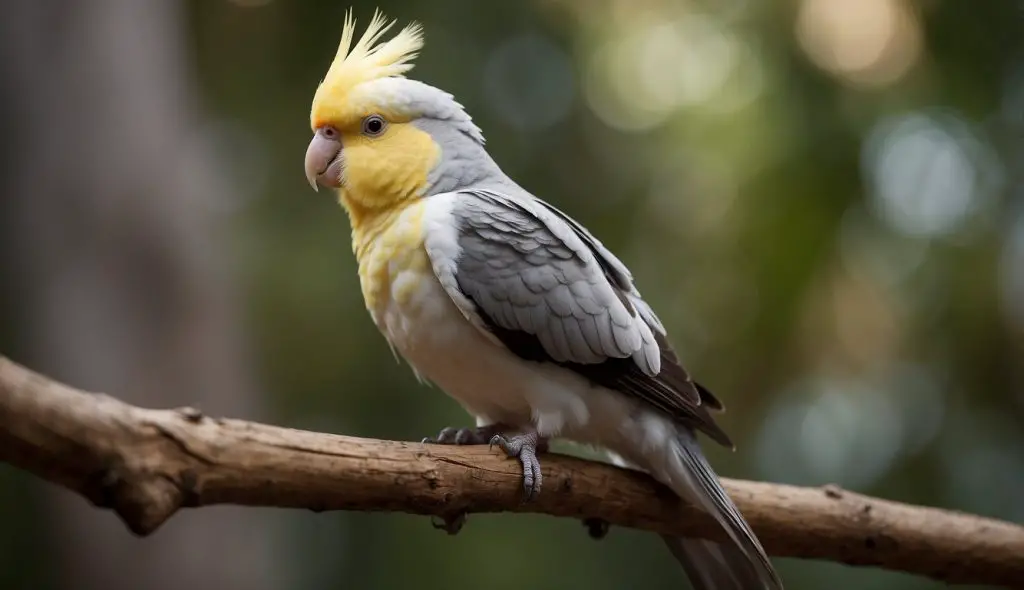
Shaking in cockatiels can span from simple excitement to serious illness.
For instance, a bird might shake its feathers after preening as part of its natural grooming process, or it might shake more intensely when frightened or stressed.
However, persistent shaking, especially when accompanied by other symptoms such as a change in droppings, appetite, or activity level, could hint at a health issue.
Providing a secure and comfortable environment, along with observing any additional symptoms, is essential in deciphering the reason behind a cockatiel’s shaking.
If ever in doubt, consulting with a veterinarian is the safest course of action to ensure the health and happiness of your feathered friend.
Key Points
- Cockatiels shake for various reasons, ranging from natural behaviors to indicators of stress or illness.
- A comfortable and stress-free environment is important for a cockatiel’s well-being.
- Persistent shaking, especially with other symptoms, warrants a veterinary consultation.
Table of Contents
Reasons for Cockatiel Shaking
Before I dive into the specifics, it’s essential for me to clarify that shaking in cockatiels can be a normal behavior or a sign of distress.
It’s important to understand the context to accurately interpret what my feathered friend is communicating.
Causes of Shaking
In my experience, the reasons a cockatiel shakes can be quite diverse. It’s important to observe the circumstances to determine the cause. Here are some common reasons:
- Stress: Just like humans, cockatiels can experience stress which may lead to shaking. This could be a response to a new environment or a stressful situation like being handled.
- Illness: If my cockatiel is frequently trembling, it could be a sign of illness. Symptoms such as lethargy or changes in appetite accompanying the shaking could indicate a health issue.
- Temperature: Cockatiels might shake to regulate their body temperature. If it’s too cold, shaking helps generate heat.
- Excitement: Sometimes, my cockatiel shakes when it’s excited or happy. This is usually seen along with chirping and lively activity.
- Bathing: After a bath, cockatiels often shake to remove excess water from their feathers.
Normal Behavior Vs. Signs of Distress
I’ve found that the key to understanding my cockatiel’s shaking is to pay attention to its body language and overall behaviors.
- Normal Behavior:
- Relaxation: Often, shaking happens as my cockatiel is settling its feathers after grooming or a cuddle.
- Activity Induced: During playful times, the shaking can be a part of its energetic behavior, which is perfectly normal.
- Signs of Distress:
- Continuous Shaking: If my cockatiel is shaking persistently without any playful or grooming context, it could be a cause for concern.
- Accompanied Symptoms: Shaking joined by other changes, such as a decrease in vocalization or altered eating habits, needs attention.
Understanding my cockatiel’s shaking is often about context and the combination of behaviors displayed. It’s important to provide a comfortable environment and keep a watchful eye for any signs that deviate from its normal behavior pattern.
Health and Illness Related Shaking
In my experience with cockatiels, shaking can sometimes be a troubling sign. It’s important for me to recognize when my feathered friend’s shivering is linked to health issues and to know when to reach out for professional help from an avian vet.
Recognizing Illness
If I notice my cockatiel shaking, it’s critical to observe other symptoms that may point to illness. Signs of illness can include:
- Lethargy: My bird is less active than usual and may sleep more.
- Ruffled feathers: Persistent fluffing up could be a way to conserve heat due to feeling unwell.
- Appetite changes: A drop in food intake often suggests that something isn’t right.
- Respiratory issues: Wheezing or labored breathing can accompany shivering.
- Behavior changes: Uncharacteristic aggression or retreat may indicate discomfort or pain.
Common Health Issues
Several health issues might cause my cockatiel to shake. They include:
- Infections: Respiratory or systemic infections could lead to shaking and require immediate attention.
- Pain: Just like us, cockatiels might shiver when in pain, whether from injury or illness.
- Seizures: Though less common, seizures can manifest as shaking or twitching and are a serious medical concern.
I keep a close eye on my cockatiel’s overall health, looking out for any combined symptoms that suggest a visit to the avian vet is needed. My vigilance is key in ensuring the well-being of my feathered companion.
Environmental Factors Causing Stress
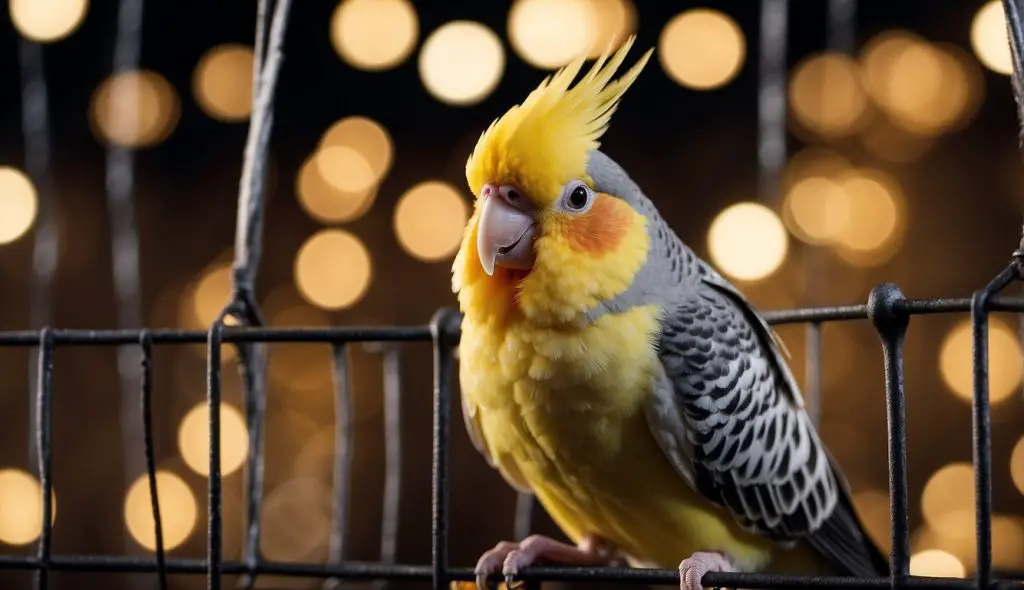
When I observe my cockatiel shaking, I consider how various environmental stressors might be impacting its well-being. Key factors such as temperature and noise levels are crucial to address for the health and comfort of pet birds.
Temperature and Comfort
I understand that the temperature of the environment can significantly affect my cockatiel’s comfort and stress levels.
If the cage is placed near windows or in areas with drafts, the cold temperature might cause my bird to shake.
Symptoms like these signal that I should move the cage to a warmer, more consistent environment.
On really chilly days, I might introduce a heated perch or use a small space heater, ensuring any heat source doesn’t become too hot or lead to overheating.
Sudden temperature changes are particularly stressful, so I aim to keep the temperature steady around my cockatiel.
Noise and Activity Level
Noise is another stressor I keenly look out for.
Loud noises easily startle cockatiels, and persistent noise can lead to chronic stress.
It’s essential for me to monitor the activity around my cockatiel’s cage, as excessive commotion or sudden loud sounds—perhaps from household electronics or outdoor construction—can cause shaking.
To keep things serene, I place my bird’s cage in a quieter part of my home, away from the commotion.
Optimal noise levels contribute to a calming environment that helps my pet feel safe and relaxed.
Cockatiel Care and Comfort
Ensuring my cockatiel’s happiness and well-being requires consistent attention to their comfort and engagement. I’ve learned that a combination of proper handling and a stimulating environment plays a pivotal role in their physical and emotional health.
Proper Handling and Attention
When it comes to my cockatiel, I understand that gentle and consistent handling builds trust and helps prevent stress.
I make it a point to spend quality time with my pet each day, which may include activities like:
- Training sessions: I keep these short and rewarding to encourage excitement and mental stimulation.
- Gentle petting and grooming: This not only helps with bonding but also allows me to check for any signs of stress or illness.
A cockatiel generally loves to be part of family life; therefore, I ensure that my pet is not isolated.
To prevent boredom and encourage happiness, I provide plenty of attention and interaction daily.
Creating a Stimulating Habitat
I believe a cockatiel’s cage is their kingdom.
So to make it fit for my avian royalty, it’s all about creating a stimulating habitat that mimics their natural environment. Here’s what I focus on:
- Toys: I provide a range of toys to satisfy my cockatiel’s need for play and mental exercise. This includes foraging toys, chewable wood, and bell toys that are regularly rotated to keep things fresh and exciting.
- Perches of different sizes and textures: This setup encourages foot exercise, which is vital for my cockatiel’s health.
- Bathing opportunities: Whether it’s a shallow dish of water or a gentle mist with a spray bottle, baths are essential for my cockatiel’s grooming routine. It helps them to preen and relax while keeping their plumage in good condition.
- Balanced diet: I offer a variety of foods—seeds, pellets, and fresh fruits and veggies—to ensure a well-balanced diet.
Having a comfortable environment that is both safe and engaging is essential for my cockatiel to thrive. I strive to keep their habitat consistent, comfortable, and full of opportunities for them to explore, play, and relax.
When Should You Consult a Veterinarian?

In caring for my cockatiel, I know that observing any sudden changes in behavior or signs of discomfort is crucial. Knowing when to consult a veterinarian can make a difference in ensuring the health and well-being of my feathered friend.
Emergency Signs
As a diligent pet owner, I stay alert for emergency signs that indicate my cockatiel needs immediate veterinary attention. Key emergency signs include:
- Excessive shaking or trembling: While occasional shaking might be normal, excessive or continuous shaking is cause for concern.
- Changes in body language or behavior: If my cockatiel demonstrates unusual lethargy, aggression, or changes in vocalization, I recognize these as potential indicators of illness.
- Physical anomalies: Any noticeable changes such as discharge from the eyes or nares, disheveled feathers, or changes in droppings warrant a visit to the vet.
Prompt action is essential if any of these signs are observed. An avian vet is specifically trained to handle the unique needs of birds like cockatiels.
Veterinary Care for Shaking
If my cockatiel is shaking, determining the cause and seeking appropriate veterinary care is important.
Factors that may lead to shaking include:
- Stress or Fear: Identifying stressors and discussing them with an avian veterinarian can help in formulating a plan to alleviate my bird’s anxiety.
- Illness or Pain: A vet can assess signs of illness or discomfort that may not be immediately obvious to me.
- Environmental Factors: If my cockatiel is exposed to toxins or an unsuitable environment, an avian vet can assist in identifying and addressing these issues.
Regular check-ups with an avian veterinarian help in early detection and treatment of any problems, ensuring that my cockatiel stays healthy and happy.
Frequently Asked Questions
In my experience with cockatiels, it’s common to have questions about their behavior, and shaking is one activity that often sparks curiosity.
Let me address some of the frequently asked questions about why a cockatiel might shake.
What can cause a cockatiel to shake while it’s puffed up?
When my cockatiel puffs up and shakes, it’s often a sign of trying to regulate its body temperature or it’s simply comfortable and content. However, consistent shaking while puffed up could also indicate stress or illness.
What does it mean if my cockatiel is shaking its tail feathers?
Shaking tail feathers can be a normal part of a cockatiel’s grooming process after preening. They do this to realign their feathers. If my cockatiel vigorously shakes its tail, it could also be a sign of excitement or happiness.
Is it normal for a cockatiel to shake in the morning?
Yes, I’ve noticed my cockatiel often shakes in the morning as a way to wake up and stretch its muscles. It’s similar to how we might stretch when we wake up.
How can I understand my cockatiel’s behavior when it shakes and closes its eyes?
When my cockatiel shakes and closes its eyes, it usually means it’s feeling relaxed and might be getting ready to nap. Frequent repetition of this behavior, though, accompanied by other symptoms, might warrant a vet visit.
Could there be a reason my cockatiel shivers or twitches occasionally?
Occasional shivering or twitching can be a natural response to a slight change in temperature or excitement. Yet, if I notice my cockatiel is doing this frequently or excessively, it’s prudent to check for other signs that could suggest health issues.
What should I consider if my cockatiel starts shaking while hissing?
Shaking accompanied by hissing can indicate that my cockatiel is frightened, threatened, or ill. Observing the context and other behaviors can help determine the cause.
If this shaking occurs repeatedly, consulting an avian vet is advisable to rule out health concerns.

